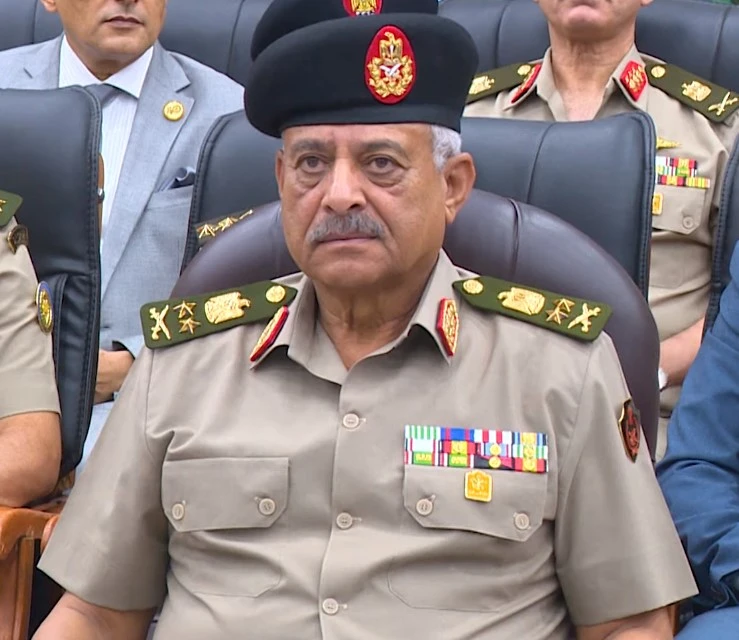Abdel-Majid Saker, Egyptian Defense Minister: Independent Leader or Shadow of Sisi?
This is an AI-generated English translation. The original text is in Arabic.
"Despite public speculation about the possibility of his liberation from the grip of the presidency, his security trajectory from 2013 until his appointment in 2024 reveals that he is a man meant to protect the regime, not to oppose it."
In this difficult phase that the Arab region is going through, voices have begun to rise discussing the expected battles regardless of their parties. Therefore, I believe it is important to take a look at the figure many consider one of the most significant personalities in this phase, which is the Egyptian Minister of Defense, Abdel-Majid Saker.
Since General Abdel-Majid Saker took the constitutional oath as Minister of Defense before Egyptian President Abdel Fattah el-Sisi on July 3, 2024, the debate over the nature and circumstances of this man's selection has not ceased, especially in light of the critical moments the region is experiencing due to the unprecedented Israeli war on Gaza and its repercussions on the region, expanding the circle of conflict to Lebanon, Syria, and Yemen.
Was Abdel-Majid Saker chosen because he is a military leader capable of making independent decisions if crises escalate? Or is he merely a loyal executor of the plans of the regime's leader in Egypt, Abdel Fattah el-Sisi? Did he rise to the top after being the governor of Suez due to his complete loyalty and security strictness, or because of the strength of his personality?
A Military Path Unfamiliar with War
Saker was born in 1955 and graduated from the Military Academy in 1977, which means he was a student at the age of nineteen when the October War of 1973 occurred, indicating that he did not participate in major regional battles or wars. His experience focused on weaponry and artillery, followed by educational and administrative positions within the military, which included:
Director of the Artillery Institute, then Deputy Director of the Recruitment Administration, then Director of Civilian Affairs, then Deputy Director of the Military Academy, and Director of the Command and Staff College.
However, the pivotal moment in his career came when he took over the management of the Military Police after 2013 amid the tense security situation in Egypt following the military coup led by Abdel Fattah el-Sisi.
The Military Police After the Coup: Loyalty Before Leadership
After the army ousted President Mohamed Morsi in July 2013, the Military Police transformed from an internal discipline body into a key arm in the equation of the "counter-revolution," as it actively participated in securing facilities, pursuing wanted individuals, and imposing field control in coordination with the Interior Ministry and intelligence services. Reports from The Doha Institute and Al Jazeera â Lubab document that the Military Police were present in widespread repression operations during this critical period in Egypt, including the dispersal of sit-ins and the pursuit of Islamists.
At that time, Abdel-Majid Saker was not the director of the Military Police but held a more significant position as the Republican Guard, which played a crucial role in the ousting of the elected President Mohamed Morsi. It seems that his success in that role qualified him for Sisi to appoint him later as the director of the Military Police. This trust that Abdel Fattah el-Sisi placed in Abdel-Majid Saker during this phase and his assignment to manage the Military Police was more of a test of loyalty than a test of combat capability; it can be said that it served as a certificate of appreciation for his previous services in the military coup.
Abdel-Majid Saker proved that he was ready to implement the security policies of the regime's leaders in Egypt without hesitation, with complete discipline in applying orders, even if they were related to sensitive issues such as dispersing protests or controlling the revolutionary street, especially the Islamists. This impeccable record in military administration and total obedience solidified his image within the regime as a trustworthy man who could be relied upon, as he neither maneuvered nor hesitated to execute orders.
The Suez Test: A Security Governor in Civilian Attire
He was then appointed as an assistant to the Minister of Defense, but in 2018, Saker was appointed as the governor of Suez after he retired due to his age. Suez, a province with a long revolutionary history, subjected Saker once again to a new political-security test, but this time in his administrative capacity, which he was accustomed to during his military service, as he dealt with important files in the province in a military manner, including:
He personally led demolition campaigns and monitored infrastructure projects with a military discipline rather than a civilian management approach. When protests erupted in September 2019, he confronted them with a strict security grip, reaffirming what he had done after the military coup and declaring a new absolute loyalty to Abdel Fattah el-Sisi.
Saker's six-year tenure in his position, despite the sensitivity of the province, is a clear indicator of his success in fulfilling the required tasks, as he imposed discipline and loyalty, prevented any attempt to turn Suez into a new center of protest, and kept the situation under control.
Returning as Minister of Defense: Gaza, Sinai, and Absolute Loyalty
Abdel-Majid Saker's appointment as Minister of Defense in July 2024 was not just a routine cabinet reshuffle but an exceptional step that carried the features of both internal and external crises. Until the evening of July 2, Egyptian newspapers were announcing the formation of the new government without mentioning any change to the name of the Minister of Defense, who was then Mohamed Zaki, Sisi's companion in the coup and the commander of the Republican Guard. However, suddenly, the very next day, on the day he took the oath, everyone was surprised that Saker, the retired general and governor of Suez, was taking the constitutional oath as Minister of Defense and Military Production after being promoted two ranks in one day to General.
This secrecy does not seem coincidental, even though the Ministry of Defense's website deleted the biography of Mohamed Zaki, the dismissed minister, and the biography of Chief of Staff Osama Askar on the same night, reflecting a clear confusion in managing the change and perhaps in its reasons as well.
More importantly, the recall of a retired general to take over the Ministry of Defense represents a break with the established traditions of the military council and a bypassing of many leaders senior to him in rank and experience, in a scene that appeared as if Sisi wanted to dismantle a controlling force within the army, not just a minister and chief of staff.
Historically in Egypt, such a step is only taken in moments of internal crises within the regime and fears of coups or disobedience from military leaders to political leadership. Sadat did the same when he clashed with Defense Minister Mohamed Sadek in 1972 and brought in General Ahmed Ismail to lead the October War. Mubarak also ousted the popular strongman Field Marshal Abu Ghazala in 1989 and relied on the retired Youssef Sabri Abu Taleb to secure his position, remaining in it for a short time. In July 2024, Sisi repeated the same scene by recalling Saker, making him the third retired Minister of Defense since the 1970s.
Behind this rare scene are some intertwined dimensions, including:
- The regional dimension, where the region is ablaze after the Al-Aqsa flood and Israel's entry into a fierce war in the Gaza Strip, as it has repeatedly threatened since the war began the necessity of relocating Palestinians to Sinai and then reoccupying the Strip, reflecting severe security threats to Egypt, especially Sinai, which borders the Strip and where Netanyahu wishes to relocate Palestinians. At the same time, the Egyptian regime does not want a Minister of Defense with strategic visions or a man with a strong voice within the army more than Sisi; rather, it only needs a man to execute the orders issued to him and ensure that the army remains within the predetermined political path.
- The internal dimension, where Sisi fears that popular sympathy for Gaza could turn into political protests, especially amid the suffocating economic crisis Egypt is experiencing, particularly during the cabinet reshuffle (inflation, power outages, state asset sales: accumulation of external debts). Having a man like Saker, who has proven high efficiency in suppressing demonstrators since 2013 and controlling protests in Suez in 2019, means that the Ministry of Defense will be the first line of defense against any internal tremors, unlike the stance taken by Field Marshal Tantawi and Sami Anan during the January 2011 revolution and Sisi's stance during the 2013 coup.
- The military institutional dimension, where Abdel-Majid Saker's appointment was a direct message to the military council leaders and Sisi's companions in his coup that the council is no longer the reference for decision-making but the presidency alone, especially after amending Article 234 of the constitution, which required the approval of the Supreme Council of the Armed Forces for the appointment of the Minister of Defense. It has now become possible to bypass it thanks to the amendments made in 2019, which Sisi used to cut off any potential alternative from any chief of staff or council member.
In conclusion, Saker's presence at the head of the Ministry of Defense sends three parallel messages from Sisi:
To the outside: Egypt will remain committed to the usual political line regarding Gaza and Sinai without surprises that disturb its neighbor Israel.
To the inside: that any wave of anger or sympathy for the Palestinians will be met with the same tools that have been used since 2013.
To the army itself: that the era of independent leaders has ended, and that the game of musical chairs will remain the primary weapon to keep everyone under control.
Summary of the Topic
Abdel-Majid Saker is not the kind of military figure who would surprise the political leadership with independent decisions or enter into conflicts with it; rather, he is a man who built his path and military life on complete loyalty and continuous discipline. He was tested in 2013 within the Republican Guard under the previous Minister of Defense, in 2014 as the director of the Military Police during the height of real confrontations, and in 2019 with the revolutionary street. He returned in 2024 to be the Minister of Defense at a moment when the regime fears any attempts that could shake the internal situation.
He is the quintessential man of the regime, executing orders without maneuvering, and he is the ideal model of what Sisi wants in this critical phase.
References and Sources
Al Jazeera â Lubab. (2019). The Role of the Military Institution in Egypt After 2013: Determinants and Pathways:lubab.aljazeera.net
The Doha Institute for Policy. (2016). The Role of the Police in Egyptâs Counter-revolution:siyasatarabiya.dohainstitute.org
The Egyptian Center for Strategic Studies (ECSS). (2022). Security and Military Capabilities in Egypt Over 10 Years:marsad.ecss.com.eg
Alamats Online. (2024, July 6). A Game of Musical Chairs or a Coup Ghost: Why Did Sisi Oust the Minister of Defense and Chief of Staff?:https://alamatonline.com/Ùعبة-ÙراسÙ-Ø£Ù-شبØ-اÙÙÙاب







.webp)
